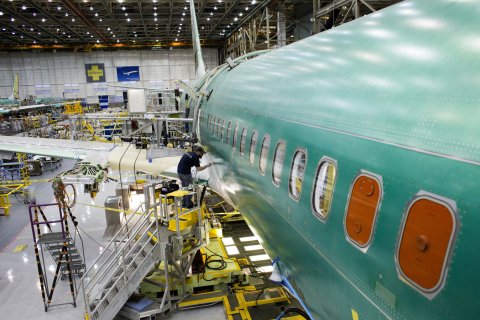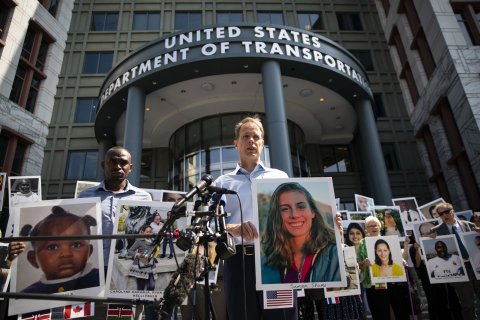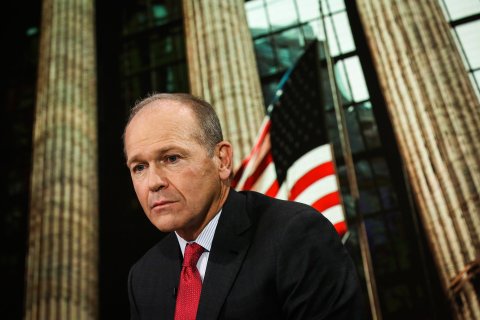When the first Boeing 737 MAX plane came off the production line in December 2015, it was the beginning of a highly anticipated new line of aircraft for the storied company. It incorporated the latest technology and was billed by Boeing as "deliver[ing] the highest efficiency, reliability and passenger comfort in the single-aisle market." Tragically, that promise came to a glaring halt with two back-to-back disasters in which flight control software known as the Maneuvering Characteristics Augmentation System (MCAS) incorrectly gauged the aircrafts' angles of ascent and prevented the pilots from manually overriding it. In total, 346 people on board Lion Air flight 610 on October 28, 2018 and Ethiopian Air flight 302 on March 10, 2019 were killed after only about 13 minutes and 6 minutes in the air, respectively.
Investigative journalist Peter Robison takes a deep dive into the ongoing problems and shortcuts at Boeing that allowed the MCAS problem to get past all the existing safeguards and the aftermath of the crashes in his new book, Flying Blind (Doubleday, November 30). In this excerpt from the book, Robison shares the untold story of the memorial for the Ethiopian Air victims and how the company excluded grieving families from planning and participating in the service in an attempt to control the narrative.

Before the pandemic became all-consuming, the looming event preoccupying some at Boeing was the one-year anniversary of the Ethiopian Airlines crash on March 10, 2020. It had the potential to be a public relations disaster, rekindling global news coverage. Boeing and the families of the victims established an uneasy partnership to plan the memorial ceremony. The manufacturer agreed to put up the money, but to the families involved in planning the event, it began to feel like a commemoration of the BP oil spill stage-managed by BP.
One day in late January, Tim Keating, the Boeing head of Government Operations, and his deputy, Jennifer Lowe, met with relatives and representatives of the victims at Ethiopian Airlines' headquarters next to the Addis Ababa airport. The offices had the drab appearance of a government embassy, except for the walls of the conference room where they met, which were painted a bright sea green. Keating, who'd attended a Jesuit college, the University of Scranton in Pennsylvania, struck a tone of pastoral generosity and said Boeing wanted to do everything it could to make the event meaningful for the grieving families.
But he quickly laid down some ground rules. Boeing would pay for no more than two representatives per family. It would cover their hotel and food for three nights. The anniversary landed on a Tuesday, and he instructed everyone to fly in on Sunday and out Wednesday, no exceptions. It was an incongruous note after the generous opening, and people started raising objections. Families would have to choose if parents or siblings, for instance, could attend. What about divorced couples—could all the stepparents come? And what if someone wanted to arrive on Saturday instead? Boeing had already pledged to spend $100 million to support families and communities after the crashes, and now it was setting limits like a corporate benefits manager.
The main reason for his interest in planning every detail, as one person there saw it, was to minimize the potential for embarrassment to Boeing. "He had that Catholic sensibility of grief and sorrow," the person said, "but his mission was a corporate mission. His mission was to manage the anniversary event with the least amount of cost and the least amount of media coverage." On every question, Keating made clear that Boeing would control access, not the families.
When one family asked to bring along a therapist, Keating said Boeing had already hired a firm that would have therapists on site. He rejected an independent videographer to record the event for those who couldn't attend; Boeing had taken care of that, too.
Journalists were out of the question.
The meeting got especially testy when the conversation turned to planning the memorial service itself. Multiple family members said they didn't want anyone from Boeing inside the tent for the eulogies; already, it felt as if the killer was planning the funeral. That came as a surprise to Keating, who said, "If we're paying for it, we'll be there."
Negotiations over the monetary relief Boeing had pledged proved just as fraught. Samya Stumo, a 24-year-old on her way to Kenya to work on broadening women's access to health care, was one of the victims of the crash. On January 30, Samya's father, Michael Stumo, met with Ken Feinberg, the lawyer Boeing had hired to help distribute the funds, for a get-acquainted lunch at the Willard Hotel in Washington, D.C. Stumo wanted to know more about how the money would be spent and hoped that at least some of it would go to the Flight ET302 Families Foundation, a nonprofit group he and his wife had helped start.

It could hardly have started more awkwardly. As they headed for the elevator, Stumo mentioned that his daughter had actually met Feinberg once, at a UMass alumni event in 2017. The famous mediator preened. "Oh yeah, I remember that speech—how's your daughter?" he asked automatically. "She's 50 feet under the ground in Addis Ababa," Stumo answered tersely.
Feinberg continued as if he hadn't made a self-centered social blunder that also suggested he hadn't done his homework on Stumo's family. Once they sat down, he lavished praise on Stumo for the work he and his wife, Nadia Milleron, had done in organizing the families. Milleron was the niece of the famed consumer-safety advocate Ralph Nader, and the couple had led an effort to hold Boeing accountable in the mold of one of his populist anti-corporate campaigns. They'd brought grieving family members in to see congresspeople and pressed Boeing Chief Executive Officer Dennis Muilenburg for answers at congressional hearings before he was ousted the previous year.
In his baritone Boston brogue that lent everything he said an avuncular air, Feinberg said he wanted to hear the couple's thoughts on how to distribute the funds. They had already been talking to Boeing's Keating about company support for their nonprofit; Keating asked for a budget proposal. Feinberg and Stumo agreed to continue the conversation.
On Valentine's Day, Michael and Nadia sat down with Feinberg and his colleague, Camille Biros, at their offices next to the Willard, filled with framed degrees and photos of Feinberg shaking hands with presidents.
A documentary called Playing God had once been made about Feinberg, who'd handled settlements for BP, Volkswagen and the Catholic Church after his star turn as the September 11 claims administrator. It depicted him as a modern-day King Solomon for the way he assigned a value to individual lives after tragedies. When the couple brought up their earlier conversations about the foundation with Keating, Feinberg told them his efforts were completely independent of Boeing. What's more, his job was to distribute immediate relief to families, not the community funds. Still, he said the couple's work was so important that he offered to advocate with Boeing for them to get the funds.
Days later, on February 17, a Boeing press release went out saying Feinberg's brief had been expanded and he'd now be in charge of distributing the entire $100 million fund, not just the half that had been promised as direct relief. But it was Keating, not Feinberg, who declined the Flight ET302 Families Foundation's $400,000 budget request that month, telling the nonprofit's director that he was hearing from "a lot of groups" and wasn't sure the foundation represented a majority of them. "It felt like the D.C. shuffle," said one person involved in the negotiations with both Keating and Feinberg. They'd meet and get information, "but in retrospect, it became clear they [Boeing] didn't have any intention of accepting our proposals," this person said. ("All I will tell you from 30,000 feet really is we haven't heard any real criticism that our program has not been independent of Boeing," Feinberg said.)
Shortly before the anniversary event, Boeing's new CEO David Calhoun gave an interview to the New York Times that brought more pain to the victims' families. His comments suggested that Boeing still hadn't internalized the lessons about its flawed design. At one point in the conversation, Calhoun implied that the pilots from Indonesia and Ethiopia, "where pilots don't have anywhere near the experience that they have here in the U.S.," were part of the problem too.

Asked whether he believed American pilots would have been able to handle a malfunction of the software, Calhoun asked to speak off the record. "Forget it," he said, when the reporters refused. "You can guess the answer." As for the larger message about Boeing's own culture: "I see a couple of people who wrote horrible emails."
On March 10, the grieving relatives filled the 373-room Ethiopian Skylight Hotel, the same place where many had gathered in the days after the crash. Since then, they'd connected through activism, countless emails and their WhatsApp chat thread. They came from 26 countries. As the families had wished, no one from Boeing was at the memorial, held under a tent at the crash site, where the dirt was laid with the petals of more than a hundred thousand roses.
They gave tributes to the victims, in a program deliberately free of any mention of the company that had brought them together, and then had six minutes and 43 seconds of silence—the exact length of the flight from takeoff to crash. They planted seeds in small ochre pots arrayed on wooden boxes, each for a different crash victim. The only jarring note was a newly erected chain-link fence around the site. "They're terrified that you guys are going to find bones," the event planner Boeing had hired told Samya's mother, Nadia.
The families returned home to a changed world: On March 11 the National Basketball Association canceled the rest of its season, and actor Tom Hanks said he and his wife had contracted the virus, the developments that, strangely, finally underlined its severity to a media-saturated populace. Theaters, music venues, bars and restaurants emptied. Intensive care units started filling and governments issued the first "stay-at-home" orders in living memories. After Samya's death and the intense confrontations that followed, Michael and Nadia weren't scared; the worst thing had already happened to them. In April at the height of lockdowns around the world, passenger traffic fell a stunning 95 percent from the same month a year earlier.
Airlines parked two-thirds of their global fleet. Instead of orders, Boeing tracked cancellations—more than one thousand in 2020. Even if it could get the four hundred MAX planes in storage flying—and after a year on the ground there was still no assurance of that from the FAA—cash-strapped airlines couldn't pay for them.
In other ways the pandemic opened up new possibilities, as Calhoun eventually acknowledged himself. The MAX scandal was swept from the front pages. In the dark calculus of 21st century corporate management, a global tragedy was also an opportunity, a chance to reset expectations for Boeing on his own terms. Boeing was no longer a corporate pariah whose mismanagement had contributed to a catastrophic loss of life; it was an endangered American manufacturer working to secure the livelihoods of tens of thousands of employees in the midst of a national emergency. "We can't lose Boeing," President Trump said.

From FLYING BLIND: Inside the 737 MAX Tragedy and the Fall of Boeing. Copyright © 2021 by Peter Robison. Published by Doubleday, an imprint of The Knopf Doubleday Publishing Group.
"Max" - Google News
November 24, 2021 at 06:00PM
https://ift.tt/3oXxXTn
Boeing Missteps on 737 MAX Went Beyond Deadly Crashes That Killed 346, new Book Reveals - Newsweek
"Max" - Google News
https://ift.tt/2YlVjXi
Bagikan Berita Ini














0 Response to "Boeing Missteps on 737 MAX Went Beyond Deadly Crashes That Killed 346, new Book Reveals - Newsweek"
Post a Comment